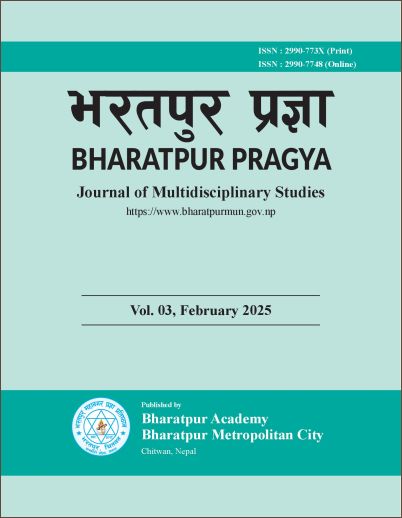Opportunities and Challenges of Sustainable Management of Historical and Cultural Site in Chitwan
DOI:
https://doi.org/10.3126/bpjms.v3i01.76246Keywords:
Cultural heritage, community-based tourism, conservation challenges, heritage preservation, sustainable managementAbstract
This study examines the opportunities and challenges of sustainably managing historical and cultural sites in Chitwan District, Nepal. The research assesses existing preservation efforts, identifies key challenges, and explores opportunities for long-term preservation and responsible promotion. Using a qualitative approach, it analyses secondary data from literature, including peer-reviewed articles, reports, and case studies, to understand sustainable management practices and conservation obstacles. Chitwan has made progress with sustainable strategies, such as community-based tourism in Patihani and Meghauli, which preserve Tharu culture through home stays and festivals. Devghat focuses on temple restorations, and Lake Twenty Thousand emphasizes biodiversity conservation. However, sites like Gadesh Dham, Bageshwori Temple, and Maha Bouddha Monastery face challenges related to underfunding and lack of coordination. National frameworks, such as the Constitution of Nepal and the Local Government Operation Act, support heritage conservation, but limited resources, infrastructure issues, and rapid urbanization hinder preservation efforts. The study identifies opportunities to improve site management, including expanding eco-tourism, promoting community-based tourism, leveraging technology, and encouraging public-private partnerships to enhance site infrastructure. Community involvement and educational programs can strengthen cultural connections and promote sustainable tourism. However, significant challenges remain, such as pollution, overcrowding, inadequate infrastructure, and a lack of professional training. Effective governance, planning, and collaboration are key to overcoming these issues. To ensure the sustainable management of Chitwan's cultural heritage, a multifaceted approach is necessary, combining conservation efforts, community participation, sustainable tourism, and collaboration among government agencies, NGOs, and local communities. Addressing these challenges and opportunities will preserve Chitwan's cultural heritage for future generations and promote responsible tourism.
Downloads
Downloads
Published
How to Cite
Issue
Section
License

This work is licensed under a Creative Commons Attribution-NonCommercial 4.0 International License.
CC BY-NC This license allows reusers to distribute, remix, adapt, and build upon the material in any medium or format for noncommercial purposes only, and only so long as attribution is given to the creator.




